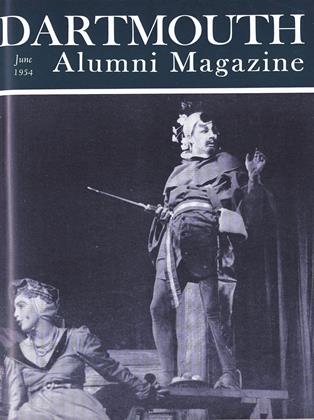SIXTY-FIVE years ago this June a letter was received in Hanover by the 1889 class secretary a few days before Commencement, which was recently found carefully put away with programs and other treasured papers relating to events attending our graduation. This letter was written by Moses Gerrish Farmer, a native of Boscawen, N. H., a member of the Class of 1844 at Dartmouth, who, in retirement, was then living in Eliot, Maine, in which town your secretary was born. It was a letter of congratulation to one about to graduate from Dartmouth, from one who occasionally had called upon the writer in his home and at times listened to his reminiscence of incidents of days he himself had spent at Dartmouth when Nathan Lord was president of the College. His great ambition to graduate from Dartmouth was thwarted when illness compelled him to leave College at end of sophomore year. His disappointment, however, was lessened when Dartmouth, in 1853. conferred upon him an honorary degree.
Upon regaining health, Farmer, in need of funds and unsuccessful in finding a school to teach, went to work in the office of a civil engineer in Portsmouth, N. H. Soon thereafter the trustees of Eliot Academy invited him to take charge of their school. He began teaching there early in March 1843. Hannah Tobey Shapleigh, one of his pupils, member of an old Eliot family, in a ceremony performed by the Eliot pastor Christmas 1844, became his wife. They went to Dover, N. H., to live. There was nothing then to indicate the possibility that Farmer would later become widely known as an inventor. It was not long, however, before his brains and hands were busy with mechanical and electrical appliances instead of teaching school. His active life brought him in contact with some of the best minds in the country. His own intellectual powers were stimulated by his conversations and discussions with Samuel F. B. Morse, inventor of the telegraph. Quickly he rose to prominence as an inventor, specializing in the field of electricity then in its early stage of development. In 1845 he began working on an undertaking, which, if successful, would be his most important invention in his thus far career. He firmly believed it possible for a car to be built equipped with electrical power sufficient to operate it for transportation of people. To solve this problem, he had to depend entirely upon his own brains and the wonderful imagination he possessed. Undaunted, he kept on working. Finally success came, the invention was brought to completion, and on July 26, 1847, the first electrically operated car was exhibited and operated in Dover, N. H.
Farmer invented a fire alarm system, later used in Boston. Some of the products of invention in general use today are the result of inventions originally made by him, and later developed to their present state of perfection. This inventor lived in several places, but his longest stay in any one place was at the Torpedo Station at Newport, R. I. It began in the early seventies. During the ten years following he was busily engaged in experimental work developing his many discoveries and inventions in the chemical and electrical laboratories erected under his direction during his early years in residence there. Again stricken with illness — this time accompanied by a paralysis destroying power of action below the waist—in the middle eighties he retired, and, with his wife and daughter, took up his residence in Eliot, Maine.
Sarah J. Farmer, his daughter and only child, inherited much of the genius her father possessed, and devoted her talents unstintedly to the welfare of the town. Her father took a deep interest in all she was doing. Most notable of her achievements in Eliot was planning and bringing into being Greenacre-on-the-Piscataqua, and managing the formal opening there in the summer of 1894 of the Greenacre Conference for the comparative study of religion, philosophy, ethics and sociology. Year after year, under the leadership of Miss Farmer, there were drawn to these conferences men and women of nation-wide prominence. On July 26, 1897, the American Institute of Electrical Engineers held its annual meeting at Greenacre-on-the-Piscataqua in commemoration of the fiftieth anniversary of exhibiting and running the first electrically operated car, invented by Moses Gerrish Farmer in Dover, N. H. A distinguished group of electrical engineers and scientists attended the meeting, including the late Charles Proteus Steinmetz, famous consulting engineer of the General Electric Company. Upon exhibition at this meeting was the original electrically operated car, brought there specially for this meeting from the Smithsonian Institute, Washington, D. C., where it was deposited many years ago for permanent preservation. Miss Farmer was present at this meeting. She died many years later. After her death, the Probate Court appointed your secretary to administer the settlement of her estate, a service he performed.
This record of the achievements of Moses Gerrish Farmer is here given in recognition of the stimulating influence your secretary received in early life from his acquaintance with this gifted pioneer inventor of the Dartmouth Class of 1844.
 View Full Issue
View Full Issue
More From This Issue
-
 Feature
FeatureTHE EXPERIMENTAL THEATRE
June 1954 By HENRY B. WILLIAMS -
 Feature
FeatureNature Conditions Architecture
June 1954 By EDGAR H. HUNTER JR. '38, -
 Class Notes
Class Notes1918
June 1954 By ERNEST H. EARLEY, RICHARD A. HOLTON -
 Class Notes
Class Notes1926
June 1954 By HERBERT H. HARWOOD, ANDREW J. O'CONNOR, Richard Eberhart '26 -
 Article
ArticleThe Faculty
June 1954 By HAROLD L. BOND '42 -
 Class Notes
Class Notes1905
June 1954 By GEORGE W. PUTNAM, FLETCHER A. HATCH
RALPH S. BARTLETT '89
Article
-
 Article
ArticleTHE OCTOBER MEETING OF THE TRUSTEES
November, 1915 -
 Article
ArticleARTICLE BY PRESIDENT APPEARS IN SCRIBNERS
MARCH, 1928 -
 Article
ArticleFilibuster Busted
May 1960 -
 Article
ArticleRadio Production
MAY 1963 -
 Article
ArticleThe College Needs ROTC
NOVEMBER 1991 -
 Article
ArticleFISH AND GAME NEW ATTRACTION
December 1935 By H.T.A.Richmond '38.




